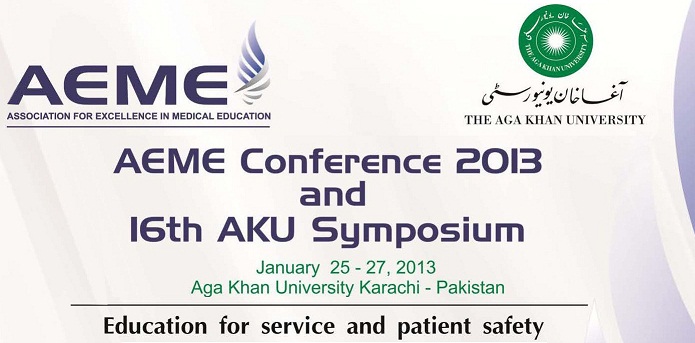Day 1 : Oral Presentations (Theme: Curriculum Innovations)
Implementing a revised bioethics curriculum at the Aga Khan University Medical College (AKU-MC)
Location
AKU Auditorium
Start Date
26-1-2013 10:40 AM
Abstract
Background: In 2009 - 2010, the bioethics curriculum for undergraduate medical program at AKU was revised to increase student engagement and to integrate into the clinically contextual curriculum, which utilizes problem-based learning (PBL) as a pedagogical approach. The revised curriculum was implemented in the 2011 – 2012 academic year, for first year students and the experience is described here.
Methods: To increase student engagement, a variety of teaching, learning and assessment strategies including interactive lectures, student presentation and worksheets were used. To integrate into the existing undergraduate medical curriculum, triggers to derive learning objectives related to bioethics were introduced in PBL cases. Faculty members who were interested in teaching of bioethics were induced to teach revised curriculum.
Results: Each student participated in three group presentations and four group paragraph writing assignments. Eight worksheets were completed by each student. In total, six sessions comprising of brief didactic lectures followed by interactive tutorials, one stand-alone lecture and one workshop on academic integrity and plagiarism were delivered over the course of the academic year. Bioethics-related triggers were introduced in four existing PBL cases.
Conclusions: Initial observations show that strategies to ensure that the revised bioethics curriculum was interactive and integrated within the PBL-based curriculum appear to have worked well. In particular, student-led presentations and ethics triggers in PBL cases were very useful. However, implementation of the revised curriculum also highlighted a number of challenges, such as the lack of human resources and strategies to assess subject cognition, which need to be addressed.
Key words: Bioethics, undergraduate medical education, curriculum development and implementation.
Implementing a revised bioethics curriculum at the Aga Khan University Medical College (AKU-MC)
AKU Auditorium
Background: In 2009 - 2010, the bioethics curriculum for undergraduate medical program at AKU was revised to increase student engagement and to integrate into the clinically contextual curriculum, which utilizes problem-based learning (PBL) as a pedagogical approach. The revised curriculum was implemented in the 2011 – 2012 academic year, for first year students and the experience is described here.
Methods: To increase student engagement, a variety of teaching, learning and assessment strategies including interactive lectures, student presentation and worksheets were used. To integrate into the existing undergraduate medical curriculum, triggers to derive learning objectives related to bioethics were introduced in PBL cases. Faculty members who were interested in teaching of bioethics were induced to teach revised curriculum.
Results: Each student participated in three group presentations and four group paragraph writing assignments. Eight worksheets were completed by each student. In total, six sessions comprising of brief didactic lectures followed by interactive tutorials, one stand-alone lecture and one workshop on academic integrity and plagiarism were delivered over the course of the academic year. Bioethics-related triggers were introduced in four existing PBL cases.
Conclusions: Initial observations show that strategies to ensure that the revised bioethics curriculum was interactive and integrated within the PBL-based curriculum appear to have worked well. In particular, student-led presentations and ethics triggers in PBL cases were very useful. However, implementation of the revised curriculum also highlighted a number of challenges, such as the lack of human resources and strategies to assess subject cognition, which need to be addressed.
Key words: Bioethics, undergraduate medical education, curriculum development and implementation.

